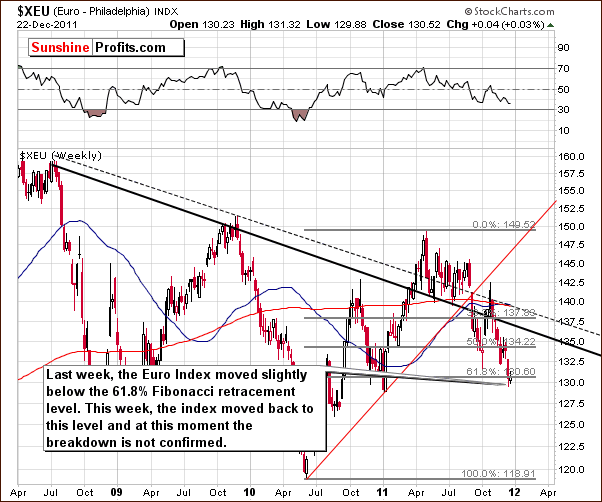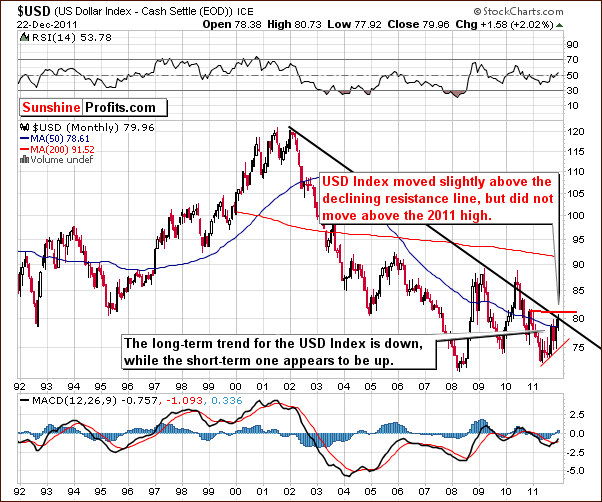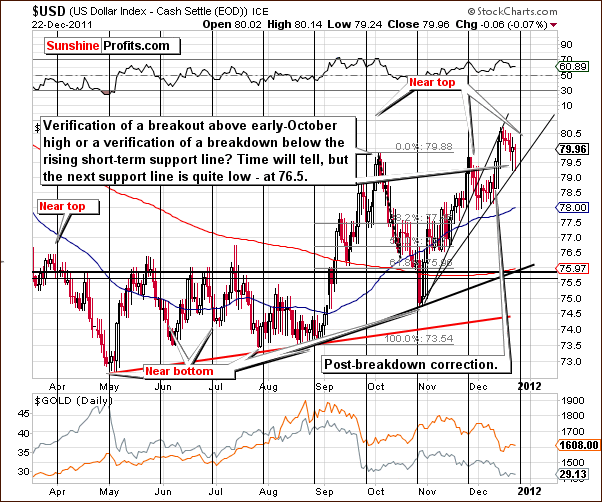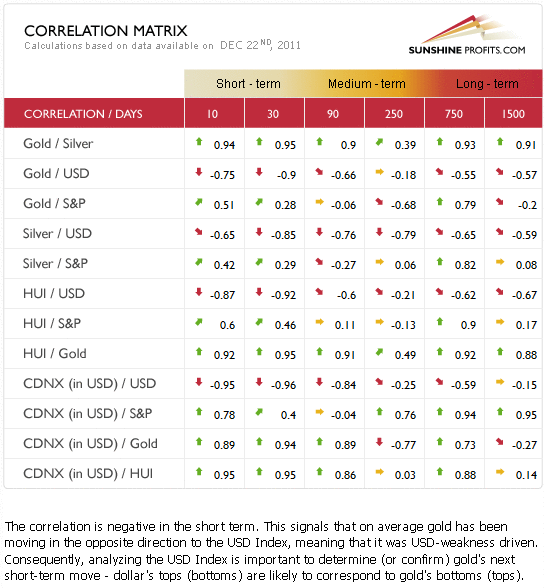Gold Might Have Already Hit Rock Bottom
Commodities / Gold and Silver 2011 Dec 27, 2011 - 12:18 PM GMT If you’re looking for a post-Christmas read, take a look at a book called “The Great Stagnation” by Tyler Cowen of George Mason University whose theme is laid out in its subtitle: “How America ate all the low-hanging fruit of modern history, got sick and will (eventually) feel better.”
If you’re looking for a post-Christmas read, take a look at a book called “The Great Stagnation” by Tyler Cowen of George Mason University whose theme is laid out in its subtitle: “How America ate all the low-hanging fruit of modern history, got sick and will (eventually) feel better.”
The interesting aspect of this book is Prof Cowen’s explanation on how the US got into its predicament.
“The American economy has enjoyed ... low-hanging fruit since at least the 17th century, whether it be free land, ... immigrant labor, or powerful new technologies. Yet during the last 40 years, that low-hanging fruit started disappearing, and we started pretending it was still there. We have failed to recognize that we are at a technological plateau and the trees are more bare than we would like to think. That’s it. That is what has gone wrong.”
Sustained economic growth requires new ideas and unfortunately, rates of invention and innovation have slowed. The high point, according to Cowen, was the late 19th and early 20th centuries, which produced: modern chemicals and so artificial fertilizers; electricity and so the electric motor, light, refrigerator, vacuum cleaner, air conditioner, radio, phonograph and television; the internal combustion engine and so the automobile; the airplane; pharmaceuticals; and mass production. These are inventions that transformed lives and caused paradigm shifts.
“Today, in contrast”, argues Cowen, “apart from the seemingly magical Internet, life in broad material terms isn’t so different from what it was in 1953.”
He concludes that “politics is very difficult in an America without much low-hanging fruit”. Also he says in explaining the financial crisis that “we thought we were richer than we were.” Americans have made demands, both collectively and individually, that they could not afford, borrowing too much and resisting both higher taxes and lower spending.
Let's begin the technical part with the analysis of currencies. We will start with the euro chart (charts courtesy by http://stockcharts.com.)

We begin with a look at the long-term Euro Index chart. We see that the index has moved lower past the level of the previous low and slightly below the 61.8% Fibonacci retracement level. The uncertainty in Europe is undoubtedly contributing to the lack of clear focus here.
However, the breakdown has not been verified yet. The index moved back above this support level and is now right at it. This means that the outlook is considerably less bearish than when it was below its final retracement level. If the index rallies and the breakdown is indeed invalidated, a significant move to the upside could very well follow.
At this time, it seems that the odds favor a rally in the Euro Index. The situation has improved in Europe and although it is still not good, it is better. The outlook for the euro therefore has improved, and the very negative publicity which has been handed out by the popular media outlets is no longer current.

Concerning the very long-term USD Index chart, we would like to stress that the dollar has not truly broken above the declining long-term resistance line, and it has not moved above the 2011 high. Consequently, one should not be overly bullish on the USD Index just yet.

The short-term USD Index chart shows us that we are coming upon a cyclical turning point here. This suggests that perhaps a sharp decline is just around the corner. Two important points worth noting are seen in the chart. First the index is currently above the level of the October high but below the early 2011 high. Secondly, it is currently below a rising support line (the upper one) which it previously broke.
Since the index is currently between two important highs from the current year, the situation is quite mixed. The index is below the rising resistance line and the cyclical turning point is just around the corner, so the overall picture is somewhat bearish.

The Correlation Matrix is a tool which we have developed to analyze the influence in the coming weeks of the currency markets and the general stock market upon the precious metals sector. Gold is negatively correlated with the USD Index in the short and medium term. The coefficients are very low and thus significantly negative. With the outlook rather bearish for the dollar at this time and its correlation significantly negative with gold, the implications are somewhat bullish for gold and the entire precious metals sector.
This is consistent with our previous remarks on the developments for the yellow metal made in our essay on a possible move up in gold:
(…) although recent declines have been sharp, multiple signs suggest that the local bottom is in and higher gold prices are now expected. The precise target levels and their “probabilities” are a more delicate matter and require further consideration based on the full spectrum of our analysis.
Summing up, based on the situation in the currency markets, a move up in gold is currently more probable than not.
To make sure that you are notified once the new features are implemented, and get immediate access to my free thoughts on the market, including information not available publicly, we urge you to sign up for our free e-mail list. Gold & Silver Investors should definitely join us today and additionally get free, 7-day access to the Premium Sections on our website, including valuable tools and unique charts. It's free and you may unsubscribe at any time.
Thank you for reading. Have a great and profitable week!
P. Radomski
Editor
Sunshine Profits
Interested in increasing your profits in the PM sector? Want to know which stocks to buy? Would you like to improve your risk/reward ratio?
Sunshine Profits provides professional support for precious metals Investors and Traders.
Apart from weekly Premium Updates and quick Market Alerts, members of the Sunshine Profits’ Premium Service gain access to Charts, Tools and Key Principles sections. Click the following link to find out how many benefits this means to you. Naturally, you may browse the sample version and easily sing-up for a free trial to see if the Premium Service meets your expectations.
All essays, research and information found above represent analyses and opinions of Mr. Radomski and Sunshine Profits' associates only. As such, it may prove wrong and be a subject to change without notice. Opinions and analyses were based on data available to authors of respective essays at the time of writing. Although the information provided above is based on careful research and sources that are believed to be accurate, Mr. Radomski and his associates do not guarantee the accuracy or thoroughness of the data or information reported. The opinions published above belong to Mr. Radomski or respective associates and are neither an offer nor a recommendation to purchase or sell securities. Mr. Radomski is not a Registered Securities Advisor. Mr. Radomski does not recommend services, products, business or investment in any company mentioned in any of his essays or reports. Materials published above have been prepared for your private use and their sole purpose is to educate readers about various investments.
By reading Mr. Radomski's essays or reports you fully agree that he will not be held responsible or liable for any decisions you make regarding any information provided in these essays or reports. Investing, trading and speculation in any financial markets may involve high risk of loss. We strongly advise that you consult a certified investment advisor and we encourage you to do your own research before making any investment decision. Mr. Radomski, Sunshine Profits' employees and affiliates as well as members of their families may have a short or long position in any securities, including those mentioned in any of the reports or essays, and may make additional purchases and/or sales of those securities without notice.
Przemyslaw Radomski Archive |
© 2005-2022 http://www.MarketOracle.co.uk - The Market Oracle is a FREE Daily Financial Markets Analysis & Forecasting online publication.



